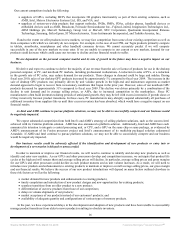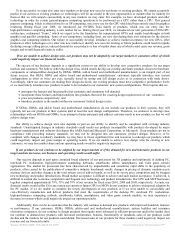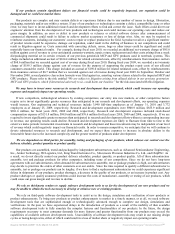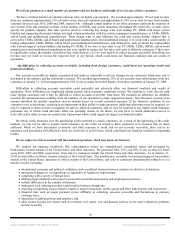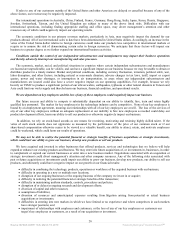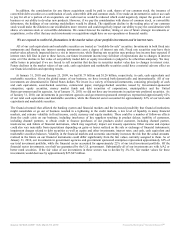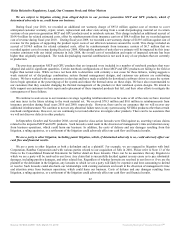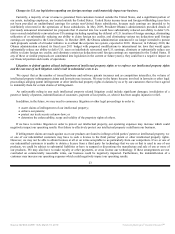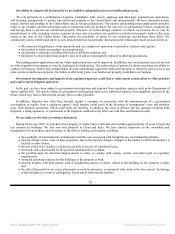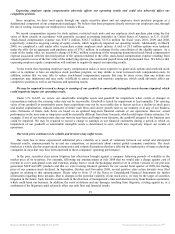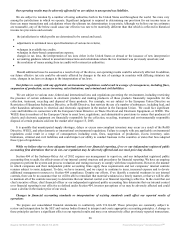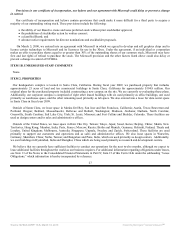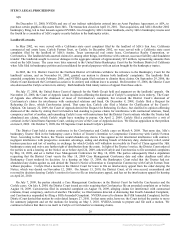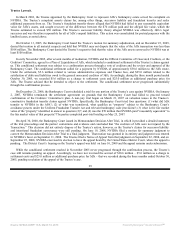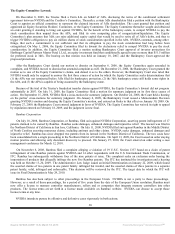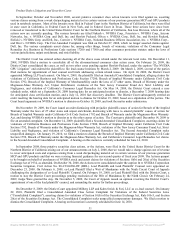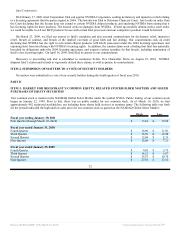NVIDIA 2010 Annual Report Download - page 35
Download and view the complete annual report
Please find page 35 of the 2010 NVIDIA annual report below. You can navigate through the pages in the report by either clicking on the pages listed below, or by using the keyword search tool below to find specific information within the annual report.
Changes in U.S. tax legislation regarding our foreign earnings could materially impact our business.
Currently, a majority of our revenue is generated from customers located outside the United States, and a significant portion of
our assets, including employees, are located outside the United States. United States income taxes and foreign withholding taxes have
not been provided on undistributed earnings for certain non-United States subsidiaries, because such earnings are intended to be
indefinitely reinvested in the operations of those subsidiaries. In May 2009, President Obama’s administration provided details of
previously announced international tax proposals that if enacted into law would have substantially reduced our ability to defer U.S.
taxes on such indefinitely reinvested non-US earnings including repealing the deferral of U.S. taxation of foreign earnings, eliminating
utilization of or substantially reducing our ability to claim foreign tax credits, and eliminating various tax deductions until foreign
earnings are repatriated to the United States. In October 2009, the Obama administration announced it no longer intended to pursue
such proposals outside of a broader initiative to overhaul the corporate tax system, expected in 2010. However, in February 2010, the
Obama administration released its fiscal year 2011 budget with proposed modifications to international tax laws that would again
substantially reduce our ability to defer U.S. taxes on indefinitely reinvested non-U.S. earnings, eliminate or substantially reduce our
ability to claim foreign tax credits, and eliminate certain tax deductions until foreign earnings are repatriated to the United States. If
any of these or similar proposals are constituted into legislation in the current or future year(s), they could have a negative impact on
our financial position and results of operations.
Litigation to defend against alleged infringement of intellectual property rights or to enforce our intellectual property rights
and the outcome of such litigation could result in substantial costs to us.
We expect that as the number of issued hardware and software patents increases and as competition intensifies, the volume of
intellectual property infringement claims and lawsuits may increase. We may in the future become involved in lawsuits or other legal
proceedings alleging patent infringement or other intellectual property rights violations by us or by our customers that we have agreed
to indemnify them for certain claims of infringement.
An unfavorable ruling in any such intellectual property related litigation could include significant damages, invalidation of a
patent or family of patents, indemnification of customers, payment of lost profits, or, when it has been sought, injunctive relief.
In addition, in the future, we may need to commence litigation or other legal proceedings in order to:
• assert claims of infringement of our intellectual property;
• enforce our patents;
• protect our trade secrets or know-how; or
• determine the enforceability, scope and validity of the propriety rights of others.
If we have to initiate litigation in order to protect our intellectual property, our operating expenses may increase which could
negatively impact our operating results. Our failure to effectively protect our intellectual property could harm our business.
If infringement claims are made against us or our products are found to infringe a third parties’ patent or intellectual property, we
or one of our indemnified customers may have to seek a license to the third parties’ patent or other intellectual property rights.
However, we may not be able to obtain licenses at all or on terms acceptable to us particularly from our competitors. If we or one of
our indemnified customers is unable to obtain a license from a third party for technology that we use or that is used in one of our
products, we could be subject to substantial liabilities or have to suspend or discontinue the manufacture and sale of one or more of
our products. We may also have to make royalty or other payments, or cross license our technology. If these arrangements are not
concluded on commercially reasonable terms, our business could be negatively impacted. Furthermore, the indemnification of a
customer may increase our operating expenses which could negatively impact our operating results.
23
Source: NVIDIA CORP, 10-K, March 18, 2010 Powered by Morningstar® Document Research℠


